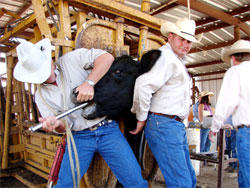Agriculture-industry experts in southwest Texas are teaching ranch management students what they won’t learn in textbooks this week during one of five weeklong trips the students will take this year.”The Great White Fleet,” a caravan of white Suburbans, takes 29 ranch management students across five regions in Texas, Kansas and Oklahoma to learn about particular agricultural methods and practices inherent to each region, said Kerry Cornelius, director of the ranch management program.
“They’ve been dealing with a seven-year drought here in the Southwest region,” said Tylor Braden, a student in the ranch management certificate program who is on the field trip. “We’re learning all the different ways producers have been confronting this challenge.”
Students will learn how professional ranch managers are adapting to the ongoing changes faced in agricultural business, said Eric Brast, assistant director of the Institute of Ranch Management.
“No textbook can provide that kind of information,” said Brast, estimating that 40 percent of the ranching curriculum is taught outside of the classroom.
Jeffrey Geider, director of the Institute of Ranch Management, worked in the region after graduating from TCU in 1981 and returned with his students Monday.
“The people here are the same,” Geider said. “What changes is how they manage through difficult situations like droughts.”
Charles Taylor, a research scientist at the Texas Agricultural Experiment Station, showed students a demonstration plot of burnt land from one, five and 10 years Wednesday. The purpose was to inform them of what to implement when doing their own rangeland brush control and fire maintenance, Cornelius said.
“Students have to build a diversification of ranching operations, so we try to expose them to as many different environments as we can,” Geider said. “There are a lot of sheep and goat operations in this area, which is something a lot of students don’t have exposure or background in.”
What students learn in southwest Texas this week could be used in the future to make money in similar regions like New Zealand, Australia and the High Deserts of the western United States, Brast said.
Alumni own and operate four of 10 ranches on the field trip and often serve students meals along the way, Cornelius said.
TCU alumnus John Welch manages Spade Ranches, which Cornelius said is one of the largest cow and calf operations in Texas and the first stop on the trip.
“My favorite part so far was meeting Mr. John Welch who I think is an unbelievably intelligent man, but very down to earth,” Braden said. “It was a tremendous opportunity to speak with him.”
Braden said the field trips set the ranch management program above others in the nation.
“People give us information that is real and that you would have a hard time otherwise garnering because they know our students are there for a trustworthy purpose,” Brast said.

